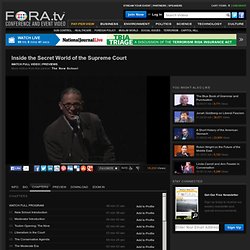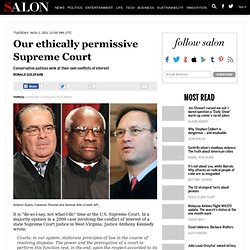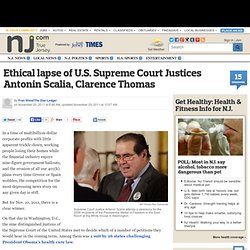

Progressive vs. Conservatives: The Supreme Court Rules. Jeffrey Toobin. Bio Nan Aron A leading voice in public interest law for over 30 years, Nan Aron is President of the Alliance for Justice, a national association of public interest and civil rights organizations.

Nan, who founded the Alliance in 1979, guides the organization in its mission to advance the cause of justice for all Americans, strengthen the public interest community's influence on national policy and foster the next generation of advocates. In 1985, Nan founded the Alliance's Judicial Selection Project, now the country's premier voice for a fair and independent judiciary and a major player in the often-controversial judicial nominations process.
Notable accomplishments include helping to defeat Robert Bork's nomination to the Supreme Court in 1987; supporting the nomination of Roger Gregory, the first African American judge in the Fourth Circuit, in 2001; and organizing the effort that helped support ten Senate filibusters against President George W. Fred P. Fred P. Jeffrey Toobin. Q&A: Lawrence Lessig. CNN: Inside the Supreme Court. [The Supreme Court: Home to America's Highest Court], 2009 Edition. The Supreme Court. The History of the Supreme Court. U.S. Supreme Court Blog. Ethics at the Supreme Court - The Hill's Pundits Blog. Democrats Seek to Impose Tougher Supreme Court Ethics. Our ethically permissive Supreme Court - Supreme Court. It is “do-as-I-say, not what-I-do” time at the U.S.

Supreme Court. In a majority opinion in a 2009 case involving the conflict of interest of a state Supreme Court justice in West Virginia, Justice Anthony Kennedy wrote: Courts, in our system, elaborate principles of law in the course of resolving disputes. The power and the prerogative of a court to perform this function rest, in the end, upon the respect accorded to its judgments. The citizen’s respect for judgments depends in turn upon the issuing court’s absolute probity.
By that standard, the Supreme Court needs to review the actions of three of its own members. As Common Cause and Alliance for Justice have documented, the past activities of Justices Clarence Thomas, Samuel Alito and Antonin Scalia raise questions about the propriety of some of their extracurricular experiences. Lawyers are reticent to question the judiciousness of judges trying their cases, for obvious tactical reasons.
And even that lame excuse may not be true. Ethical lapse of U.S. Supreme Court Justices Antonin Scalia, Clarence Thomas. AP Photo/Ron EdmondsSupreme Court Justice Antonin Scalia attends a ceremony for the 2008 recipients of the Presidential Medal of Freedom in the East Room at the White House in Washington.

In a time of multibillion-dollar corporate profits with little apparent trickle-down, working people losing their homes while the financial industry enjoys nine-figure government bailouts, and the erosion of all our 401(k) plans every time Greece or Spain wobbles, the competition for the most depressing news story on any given day is stiff. But for Nov. 10, 2011, there is a clear winner. On that day in Washington, D.C., the nine distinguished justices of the Supreme Court of the United States met to decide which of a number of petitions they would hear in the coming term.
Among them was a suit by 26 states challenging President Obama’s health care law. The justices agreed to grant that petition and put it on their March calendar. Supreme Court Center: Supreme Court: Present Justices. U.S. Supreme Court Justices. LII: Supreme Court Collection Home. Cases and Codes: Supreme Court Opinions. The Supreme Court Historical Society - Home.
Supreme Court of the United States. Roberts Court (2010- ) A Multimedia Archive of the Supreme Court of the United States. SCOTUSblog.